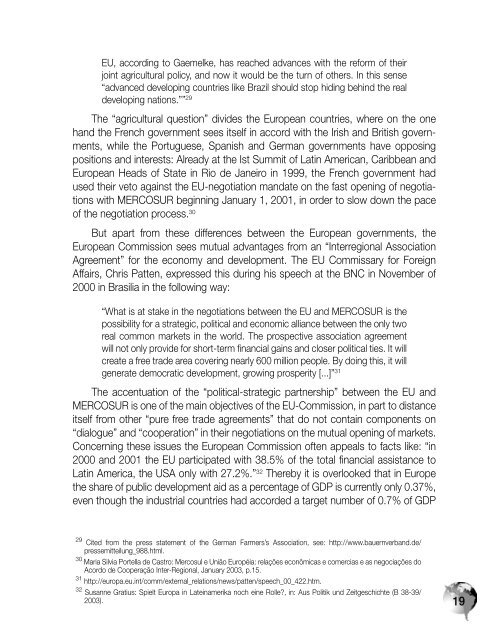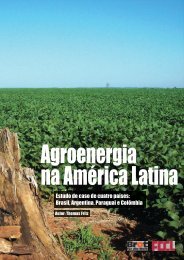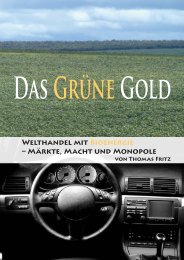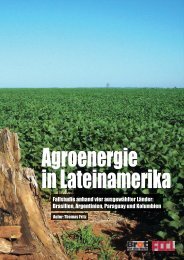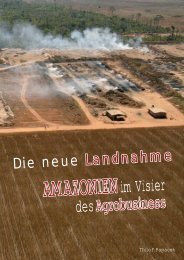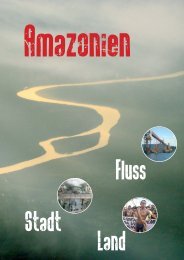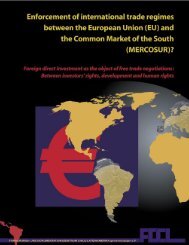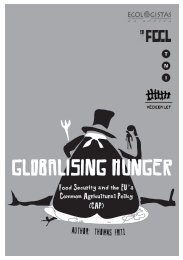Download - FDCL
Download - FDCL
Download - FDCL
Create successful ePaper yourself
Turn your PDF publications into a flip-book with our unique Google optimized e-Paper software.
EU, according to Gaemelke, has reached advances with the reform of their<br />
joint agricultural policy, and now it would be the turn of others. In this sense<br />
“advanced developing countries like Brazil should stop hiding behind the real<br />
developing nations.”” 29<br />
The “agricultural question” divides the European countries, where on the one<br />
hand the French government sees itself in accord with the Irish and British governments,<br />
while the Portuguese, Spanish and German governments have opposing<br />
positions and interests: Already at the Ist Summit of Latin American, Caribbean and<br />
European Heads of State in Rio de Janeiro in 1999, the French government had<br />
used their veto against the EU-negotiation mandate on the fast opening of negotiations<br />
with MERCOSUR beginning January 1, 2001, in order to slow down the pace<br />
of the negotiation process. 30<br />
But apart from these differences between the European governments, the<br />
European Commission sees mutual advantages from an “Interregional Association<br />
Agreement” for the economy and development. The EU Commissary for Foreign<br />
Affairs, Chris Patten, expressed this during his speech at the BNC in November of<br />
2000 in Brasilia in the following way:<br />
“What is at stake in the negotiations between the EU and MERCOSUR is the<br />
possibility for a strategic, political and economic alliance between the only two<br />
real common markets in the world. The prospective association agreement<br />
will not only provide for short-term financial gains and closer political ties. It will<br />
create a free trade area covering nearly 600 million people. By doing this, it will<br />
generate democratic development, growing prosperity [...]” 31<br />
The accentuation of the “political-strategic partnership” between the EU and<br />
MERCOSUR is one of the main objectives of the EU-Commission, in part to distance<br />
itself from other “pure free trade agreements” that do not contain components on<br />
“dialogue” and “cooperation” in their negotiations on the mutual opening of markets.<br />
Concerning these issues the European Commission often appeals to facts like: “in<br />
2000 and 2001 the EU participated with 38.5% of the total financial assistance to<br />
Latin America, the USA only with 27.2%.” 32 Thereby it is overlooked that in Europe<br />
the share of public development aid as a percentage of GDP is currently only 0.37%,<br />
even though the industrial countries had accorded a target number of 0.7% of GDP<br />
29 Cited from the press statement of the German Farmers’s Association, see: http://www.bauernverband.de/<br />
pressemitteilung_988.html.<br />
30 Maria Silvia Portella de Castro: Mercosul e União Européia: relações econômicas e comercias e as negociações do<br />
Acordo de Cooperação Inter-Regional, January 2003, p.15.<br />
31 http://europa.eu.int/comm/external_relations/news/patten/speech_00_422.htm.<br />
32 Susanne Gratius: Spielt Europa in Lateinamerika noch eine Rolle?, in: Aus Politik und Zeitgeschichte (B 38-39/<br />
2003).<br />
19


